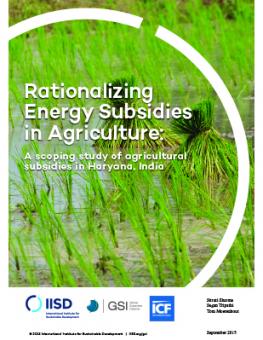
Rationalizing Energy Subsidies in Agriculture: A scoping study of agricultural subsidies in Haryana, India
This study untangles the energy-water nexus by analyzing how subsidized electricity has incentivized groundwater extraction in Haryana, India.
This study, undertaken by IISD-GSI and ICF International, untangles the energy-water nexus by analyzing how subsidized electricity has incentivized groundwater extraction in Haryana, India.
The research identifies agricultural subsidies in general and then quantifies the major irrigation, fertilizer and agricultural electricity subsidies. It finds that, in the basket of normalized electricity, surface irrigation and fertilizer subsidies available to farmers in 2015, the largest share of subsidies goes to electricity for groundwater extraction (51 per cent), followed by fertilizer subsidies (35 per cent). Taking subsidies as the percentage of profit margins, the study identifies that wheat farmers will have more difficulties with subsidy rationalization and rice farmers will have less.
The study concludes with options available for the reform of electricity, irrigation and fertilizer subsidies. Given the diversity of Haryana in terms of groundwater levels, canal water availability, electricity supply, fertilizer availability and soil quality, along with a host of other region-specific issues, this study recommends spatial targeting. Developing a crop-specific strategy for select districts is considered the only sustainable way forward. The paper highlights the financial case for energy-efficient pumpsets in particular regions. It also emphasizes the general need for more in-depth political economy analysis of the political action and influence by consumer groups from one side, and the operation and future of distribution companies from another.
Participating experts
You might also be interested in
Implementing Solar Irrigation Sustainably
This guidebook provides recommendations to state policy-makers on how they can implement solar irrigation models, particularly decentralized solar plants for irrigation under the PM-KUSUM scheme, effectively and sustainably.
Increased Support Needed to Achieve India's Clean Energy Goals
India is on track to achieve many of its 2030 clean energy goals but needs to step up government support measures to accelerate the deployment of offshore wind, electric vehicles, and green hydrogen, according to a new report.
India Faces Clean Energy Challenges as Energy Demand Soars and Global Fossil Fuel Subsidies Rise
New research finds the global energy crisis and increasing energy demand have pushed India's energy subsidies to a 9-year high.
G20 energy ministers call for cooperation on nuclear energy & low-emission hydrogen
The Group of 20 energy ministers' meeting concluded in Goa on July 22, 2023, with the final summary failing to include language on the phase-down of unabated fossil fuels.